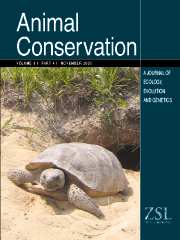Crossref Citations
This article has been cited by the following publications. This list is generated based on data provided by
Crossref.
Gurevitch, Jessica
Curtis, Peter S.
and
Jones, Michael H.
2001.
Vol. 32,
Issue. ,
p.
199.
Milner-Gulland, E.J.
and
Akçakaya, H.Resit
2001.
Sustainability indices for exploited populations.
Trends in Ecology & Evolution,
Vol. 16,
Issue. 12,
p.
686.
Côté, I. M.
Mosqueira, I.
and
Reynolds, J. D.
2001.
Effects of marine reserve characteristics on the protection of fish populations: a meta‐analysis.
Journal of Fish Biology,
Vol. 59,
Issue. sA,
p.
178.
Pauly, Daniel
Christensen, Villy
Guénette, Sylvie
Pitcher, Tony J.
Sumaila, U. Rashid
Walters, Carl J.
Watson, R.
and
Zeller, Dirk
2002.
Towards sustainability in world fisheries.
Nature,
Vol. 418,
Issue. 6898,
p.
689.
Apostolaki, P
Milner-Gulland, E J
McAllister, M K
and
Kirkwood, G P
2002.
Modelling the effects of establishing a marine reserve for mobile fish species.
Canadian Journal of Fisheries and Aquatic Sciences,
Vol. 59,
Issue. 3,
p.
405.
Link, Jason S
and
Demarest, Chad
2003.
Trawl hangs, baby fish, and closed areas: a win–win scenario.
ICES Journal of Marine Science,
Vol. 60,
Issue. 5,
p.
930.
Russ, Garry R
and
Zeller, Dirk C
2003.
From Mare Liberum to Mare Reservarum.
Marine Policy,
Vol. 27,
Issue. 1,
p.
75.
Micheli, Fiorenza
Halpern, Benjamin S.
Botsford, Louis W.
and
Warner, Robert R.
2004.
TRAJECTORIES AND CORRELATES OF COMMUNITY CHANGE IN NO-TAKE MARINE RESERVES.
Ecological Applications,
Vol. 14,
Issue. 6,
p.
1709.
Beger, Maria
Harborne, Alastair R.
Dacles, Terence P.
Solandt, Jean-Luc
and
Ledesma, Gerardo L.
2004.
A Framework of Lessons Learned from Community-Based Marine Reserves and Its Effectiveness in Guiding a New Coastal Management Initiative in the Philippines.
Environmental Management,
Vol. 34,
Issue. 6,
p.
786.
SIRÉN, ANDERS
HAMBÄCK, PETER
and
MACHOA, JOSÉ
2004.
Including Spatial Heterogeneity and Animal Dispersal When Evaluating Hunting: a Model Analysis and an Empirical Assessment in an Amazonian Community.
Conservation Biology,
Vol. 18,
Issue. 5,
p.
1315.
HAWKINS, JULIE P.
and
ROBERTS, CALLUM M.
2004.
Effects of Artisanal Fishing on Caribbean Coral Reefs.
Conservation Biology,
Vol. 18,
Issue. 1,
p.
215.
J. Miller, Karen
Mundy, Craig N.
and
Lindsay Chadderton, W.
2004.
Ecological and genetic evidence of the vulnerability of shallow‐water populations of the stylasterid hydrocoral Errina novaezelandiae in New Zealand's fiords.
Aquatic Conservation: Marine and Freshwater Ecosystems,
Vol. 14,
Issue. 1,
p.
75.
Martin-Smith, Keith M
Samoilys, Melita A
Meeuwig, Jessica J
and
Vincent, Amanda C.J
2004.
Collaborative development of management options for an artisanal fishery for seahorses in the central Philippines.
Ocean & Coastal Management,
Vol. 47,
Issue. 3-4,
p.
165.
Reynolds, John D
Dulvy, Nicholas K
Goodwin, Nicholas B
and
Hutchings, Jeffrey A
2005.
Biology of extinction risk in marine fishes.
Proceedings of the Royal Society B: Biological Sciences,
Vol. 272,
Issue. 1579,
p.
2337.
Begg, Gavin A
Mapstone, Bruce D
Williams, Ashley J
Adams, Samantha
Davies, Campbell R
and
Lou, Dong C
2005.
Multivariate life-history indices of exploited coral reef fish populations used to measure the performance of no-take zones in a marine protected area.
Canadian Journal of Fisheries and Aquatic Sciences,
Vol. 62,
Issue. 3,
p.
679.
Côté, I.M
Gill, J.A
Gardner, T.A
and
Watkinson, A.R
2005.
Measuring coral reef decline through meta-analyses.
Philosophical Transactions of the Royal Society B: Biological Sciences,
Vol. 360,
Issue. 1454,
p.
385.
Gerber, Leah R.
Beger, Maria
McCarthy, Michael A.
and
Possingham, Hugh P.
2005.
A theory for optimal monitoring of marine reserves.
Ecology Letters,
Vol. 8,
Issue. 8,
p.
829.
Micheli, Fiorenza
Benedetti-Cecchi, Lisandro
Gambaccini, Silvia
Bertocci, Iacopo
Borsini, Costanza
Osio, Giacomo Chato
and
Romano, Federico
2005.
CASCADING HUMAN IMPACTS, MARINE PROTECTED AREAS, AND THE STRUCTURE OF MEDITERRANEAN REEF ASSEMBLAGES.
Ecological Monographs,
Vol. 75,
Issue. 1,
p.
81.
McClanahan, Tim
2006.
Coral Reef Conservation.
p.
147.
Claudet, J.
Pelletier, D.
Jouvenel, J.-Y.
Bachet, F.
and
Galzin, R.
2006.
Assessing the effects of marine protected area (MPA) on a reef fish assemblage in a northwestern Mediterranean marine reserve: Identifying community-based indicators.
Biological Conservation,
Vol. 130,
Issue. 3,
p.
349.




